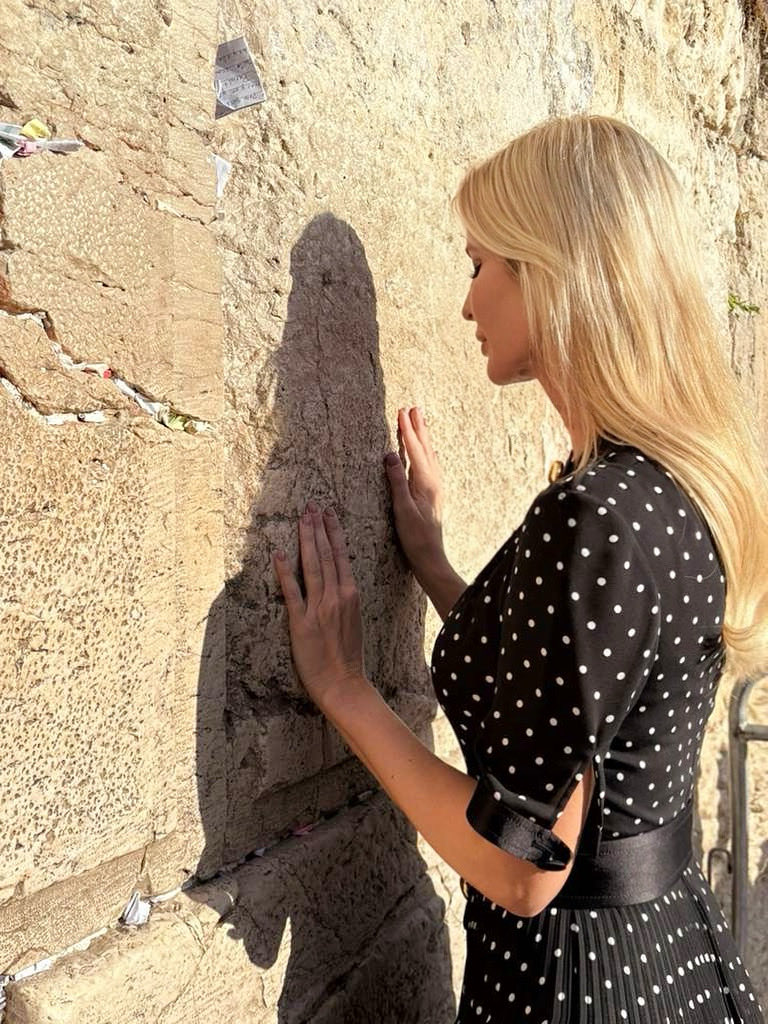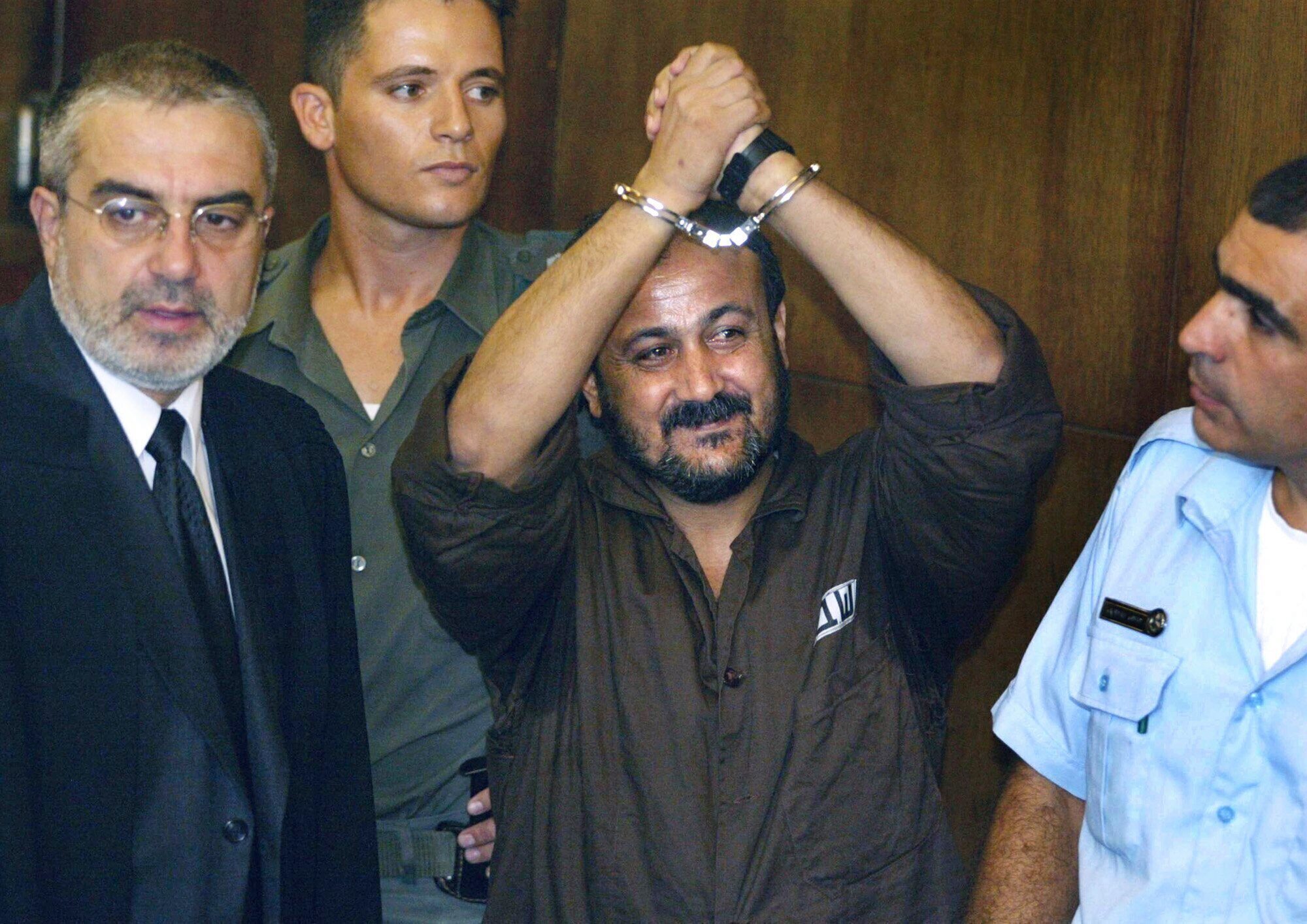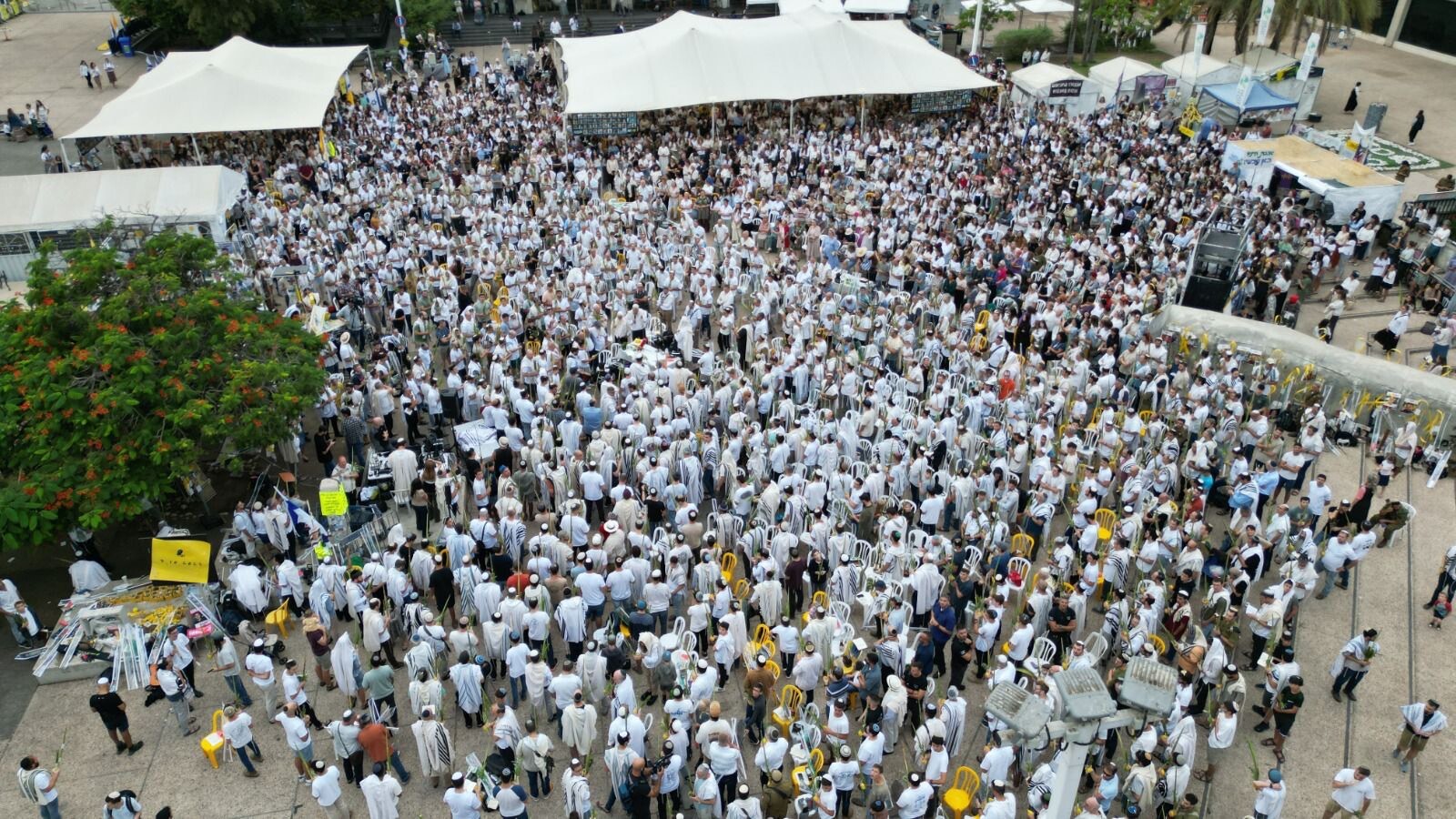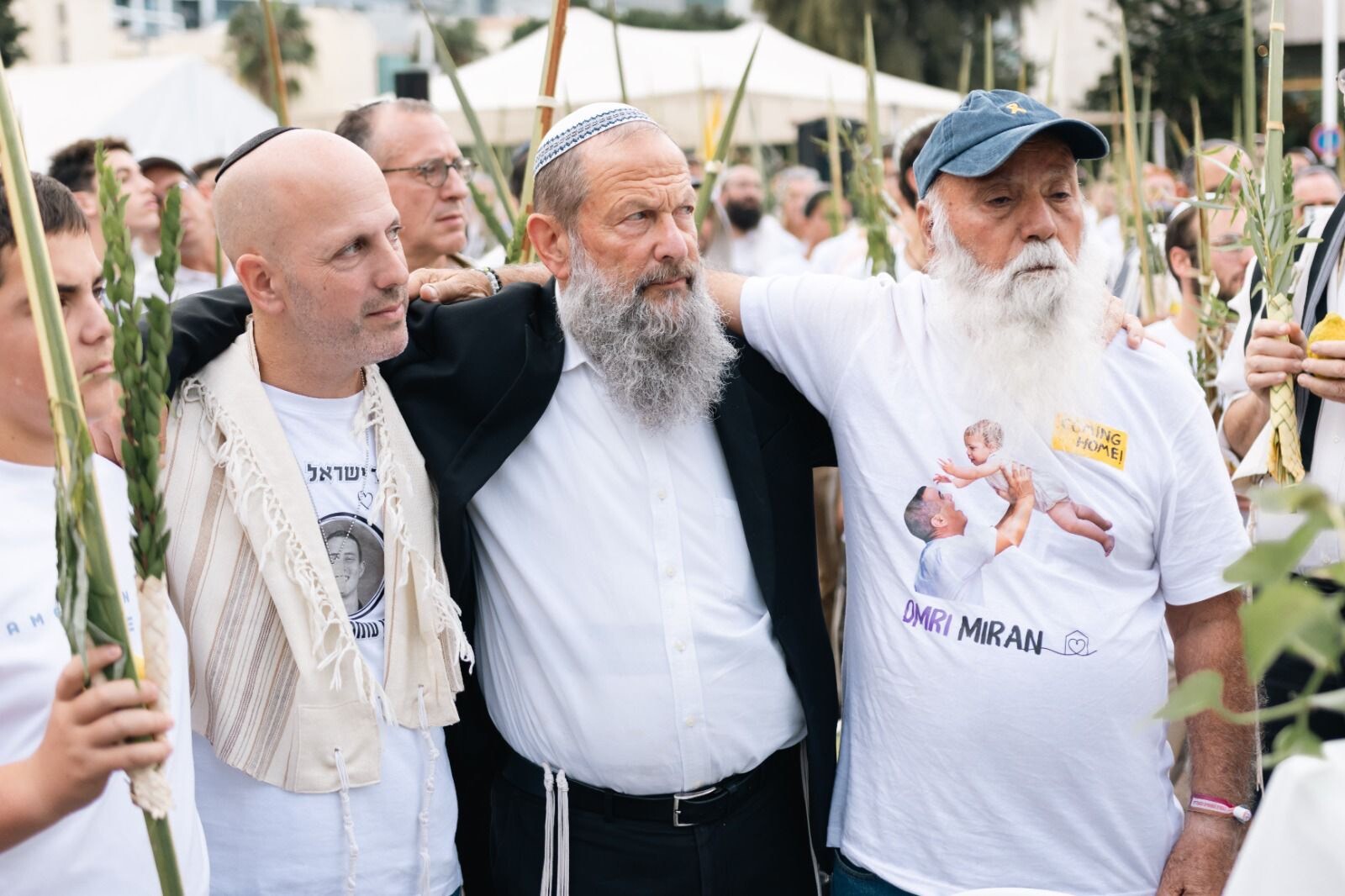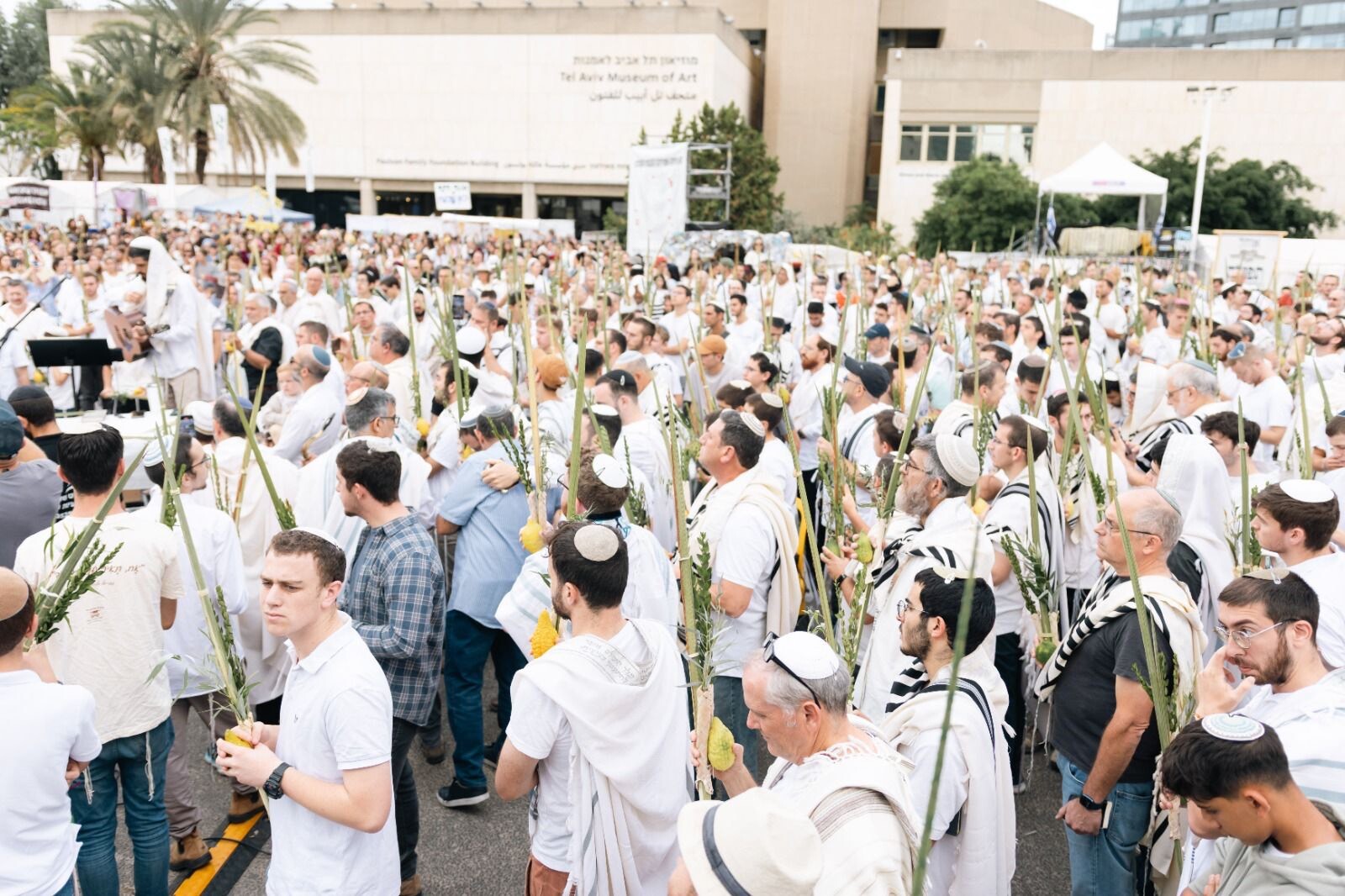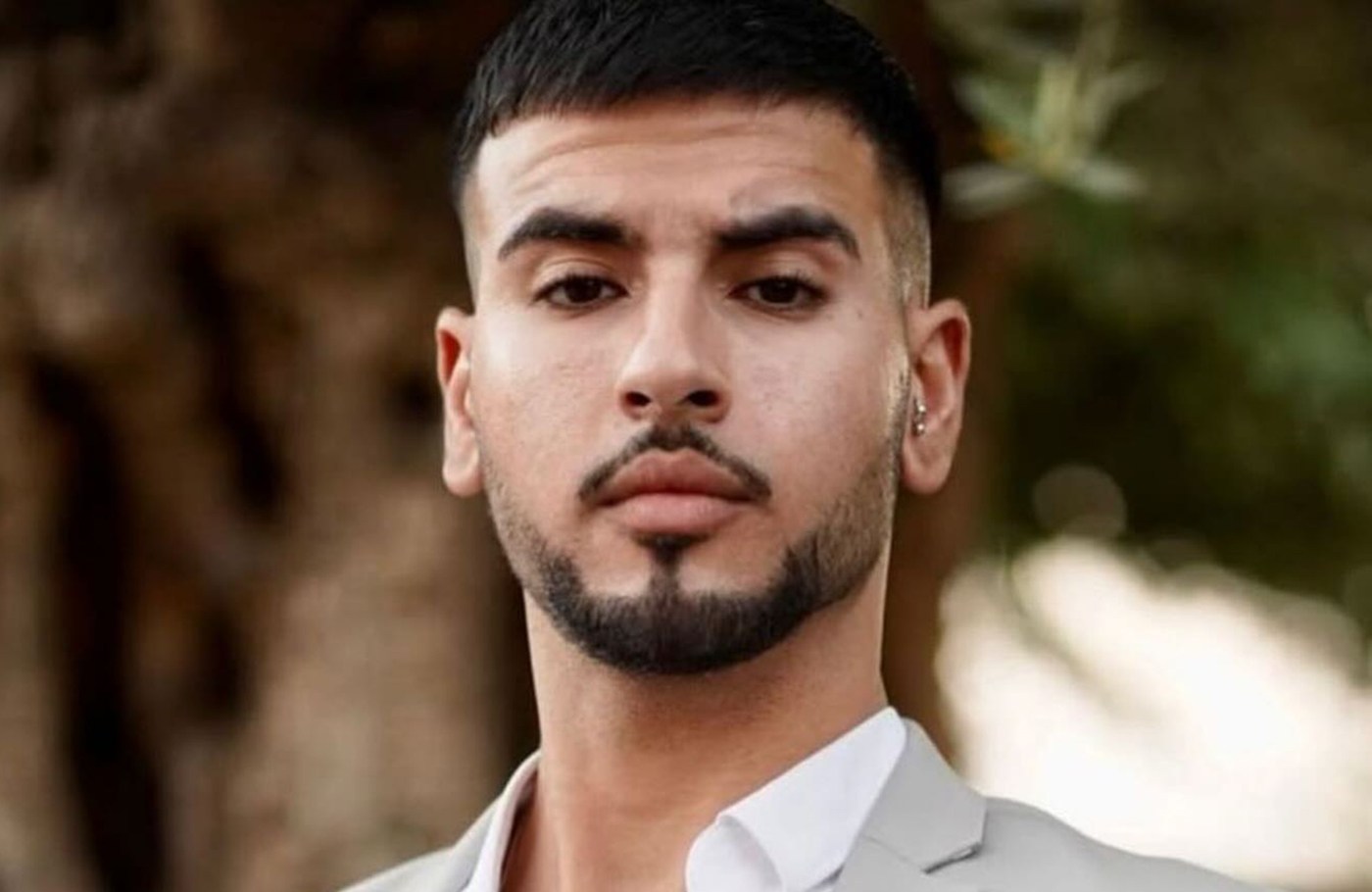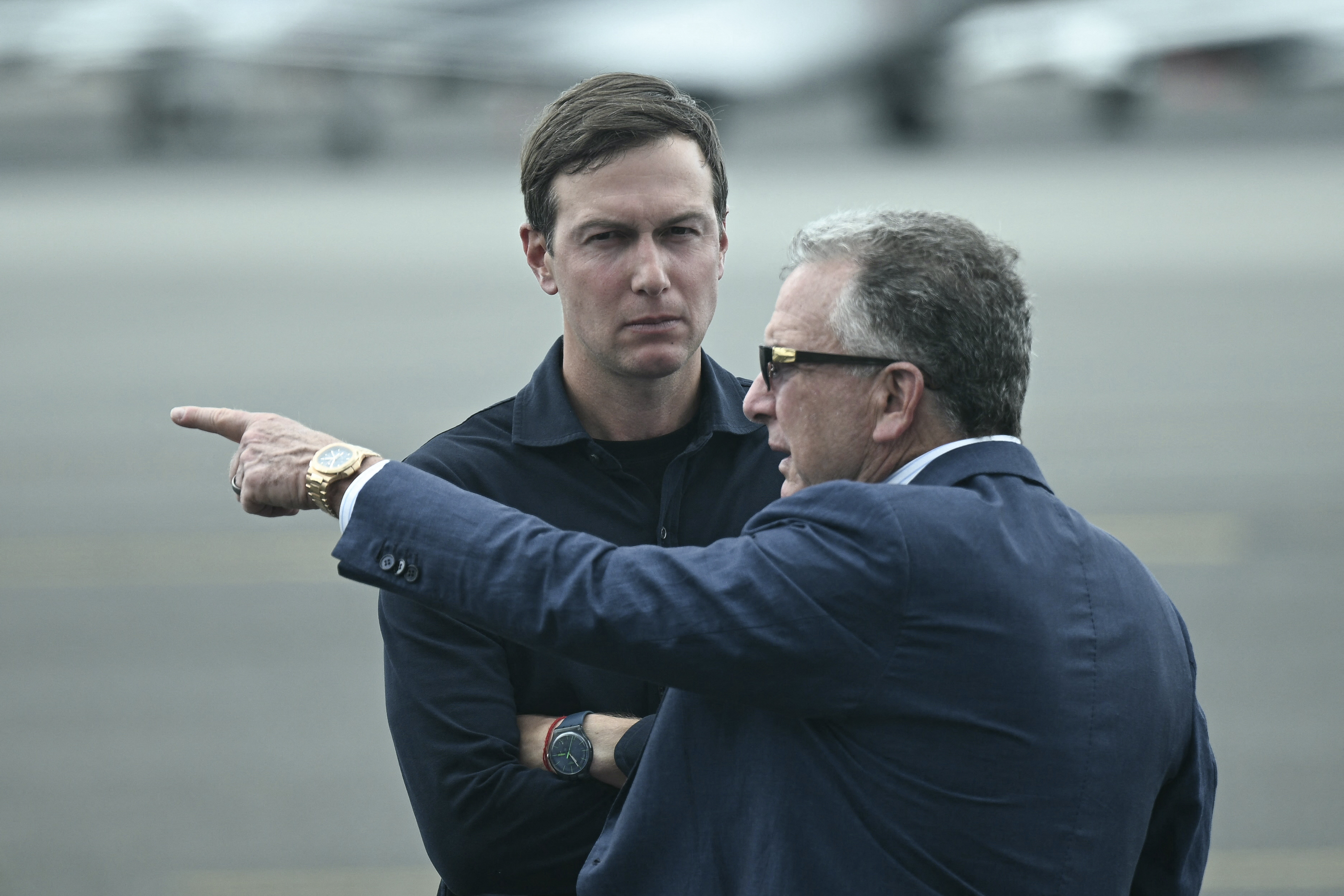Pictures from the Strip show Palestinians returning home after the Israeli withdrawal.
The Foreign Press Association (FPA), a non-profit representing members of the press working in Israel, the West Bank and Gaza Strip, has called for Israel to allow international journalists into Gaza.
“With the halt in fighting, we renew our urgent call for Israel to open the borders immediately and allow international media free and independent access to the Gaza Strip,” it said.
The FPA has repeatedly called for foreign journalists to be allowed in to Gaza over the past two years.
“These demands have been repeatedly ignored, while our Palestinian colleagues have risked their lives to provide tireless and brave reporting from Gaza.”
Israel’s supreme court will hear the petition demanding access on October 23, however the FPA said there was “no reason to wait that long”.
President Trump is set to meet world leaders during his trip to the Middle East on Tuesday. Invitations have been extended to Sir Keir Starmer and the leaders of Germany, France, Italy, Qatar, the UAE, Jordan, Turkey, Saudi Arabia, Pakistan and Indonesia, Axios reported.
The summit, organised by President Sisi of Egypt, aims to build international support for Trump’s Gaza peace plan. Trump will be in the region for the release of the Israeli hostages as part of the ceasefire deal.
President Putin of Russia has praised President Trump’s efforts to resolve “complex crises” and said that if the Gaza ceasefire deal holds, it would be a “historic” achievement.
Asked if he thought Trump had been unjustly overlooked for the Nobel peace prize, Putin said he was not the one to decide but praised Trump’s efforts toward ceasefires in Gaza and Ukraine.
“He’s really doing a lot to resolve such complex crises that have lasted for years and even decades,” Putin said.
Trump was quick to thank Putin, posting on his Truth Social network a video showing the Russian president’s comments and quoting his praise.
A senior Hamas official has said the ceasefire would not have been achieved without President Trump. Hamas would not, however, welcome the involvement of Tony Blair in running Gaza, because of his role in the wars in Iraq and Afghanistan.
Basem Naim told Sky News: “Without the personal interference of President Trump in this case, I don’t think that it would have happened to have reached the end of the war.
“When it comes to Tony Blair, unfortunately, we Palestinians, Arabs and Muslims and maybe others around the world have bad memories of him.”
Nicholas Hopton, former UK ambassador to Iran and Qatar, has described to Times Radio the potential difficulties of reaching a disarmament agreement with Hamas.
“One might foresee ways forward where a certain level of disarmament of, certainly, major weaponry and munitions is achievable in the short term,” Hopton said. “But probably Hamas would not be willing, I would imagine, to hand over those weapons to the Israeli forces or even the United States or other international western forces.
“But they might get to a much better position in terms of disarmament if it was a case of handing over weaponry to other Palestinian authorities who had an empowered role within the future arrangements.”
President Trump’s daughter, Ivanka, and son-in-law Jared Kushner have visited the Western Wall in Jerusalem, along with Steve Witkoff, the US special envoy.
Ivanka Trump at the Western Wall
At the wall, Witkoff told reporters that he was “very happy” about the newly-signed ceasefire in Gaza, which he helped broker. “We are very happy that the hostages will hopefully out on Monday,” he said. “There will be peace, and lots of lives saved.”
Please enable cookies and other technologies to view this content. You can update your cookies preferences any time using privacy manager.
Enable cookiesAllow cookies once
Witkoff and Kushner arrived in Israel on Thursday. Trump is set to join them and his daughter in Israel on Monday morning, when he will address the Knesset.
A UN source has said says Israel has approved the delivery of UN aid to Gaza, starting on Sunday. Some 170,000 tonnes are waiting in neighbouring countries including Jordan and Egypt.
The UN and its partners had only been able to deliver 20 per cent of the aid needed to address the dire situation in the Gaza Strip, Tom Fletcher, the UN’s emergency relief chief, said on Friday. The previous day he had said that all entry points to Gaza must be opened to allow the delivery of aid at a “much, much greater scale”.
As Israelis emerge from two years of Hamas captivity in the coming days, emergency teams are on standby to receive them — but are in the dark about what to expect. Those released in the last round of exchanges were emaciated, weak and traumatised, but still standing. Edited videos show the current captives skeletal and gaunt, begging for their lives.
There were celebrations in Hostages Square, Tel Aviv, after the announcement that Israel and Hamas had agreed to the first phase of a peace plan
EMILIO MORENATTI/AP
“They are, based on testimonies and what we know, in real-life danger — life-threatening condition — at every moment, so there is urgency to get them out now,” said Professor Hagai Levine, who is head of the health team for the hostages’ families.
But the hostages also face an unending road to recovery that involves what psychologists are terming a process of humanisation. After two years of being dehumanised by Hamas, Levine said, they needed a process “to become humans again — in terms of behaviour, in terms of autonomy and control, in terms of taking the role not of an object, but of an individual who can make his own decisions, which is a complex process.”
• Read in full: Gaza hostages ‘will need to become humans again’ after release
Maria Corina Machado has dedicated her Nobel peace prize to the “suffering people of Venezuela” — and President Trump.
The Venezuelan opposition leader thanked Trump for his “decisive support” for her country’s pro-democracy movement. She wrote on X: “We are on the threshold of victory and today, more than ever, we count on President Trump, the people of the United States, the peoples of Latin America, and the democratic nations of the world as our principal allies to achieve freedom and democracy.”
Her post was shared by Karoline Leavitt, the White House press secretary.
Sir Keir Starmer and the leaders of France and Germany have agreed to back “substantive humanitarian aid packages” for Gaza during the ceasefire. In a statement they said: “We welcome the agreement on a ceasefire in the Middle East, the planned release of hostages, and the resumption of humanitarian aid to the civilian population of Gaza.
“We pay tribute to President Trump’s leadership on the issue, to the diplomatic efforts of the mediators, Egypt, Qatar and Turkey, and to the vital support from the wider region to secure the agreement.
“It is now of utmost importance that all parties implement their obligations in full and without delay. We stand ready to support further talks on the next stages of the plan and to contribute to it. As part of this effort, we agree that the UN security council should give its full backing to the plan and support its implementation. We commit to supporting substantive humanitarian aid packages through UN agencies to be delivered as soon as the ceasefire enters into effect.”
Palestinian merchants loaded lorries with fruit and other food supplies and drove into Gaza City
AHMED MAQADEMA/ANDALOU/GETTY IMAGES
Israeli forces announced that a ceasefire would take effect at noon
AHMED MAQADEMA/ANDALOU/GETTY IMAGES
The lorries entered Gaza along the Netzarim Corridor
AHMED MAQADEMA/ANDALOU/GETTY IMAGES
Binyamin Netanyahu has criticised the Nobel committee for awarding this year’s peace prize to Maria Corina Machado, a Venezuelan politician, rather than President Trump.
“The Nobel committee talks about peace. President Donald Trump makes it happen,” he wrote on his English-language X account. The facts speak for themselves. President Trump deserves it.”
The White House condemned the committee’s decision, claiming it had chosen “politics over peace”.
On Thursday Netanyahu shared an AI-generated image of himself awarding Trump the peace prize.
Please enable cookies and other technologies to view this content. You can update your cookies preferences any time using privacy manager.
Enable cookiesAllow cookies once
• Read in full: Which ‘seven wars’ did Trump end? His claims fact-checked
Tess Ingram of Unicef has told how children in Gaza were excited by the ceasefire and the prospect of returning to their old lives.
Ingram, who is based in al-Mawasi, southern Gaza, told Al Jazeera: “Children were jumping around, celebrating; a little girl hugged me and said ‘thank you’. I think that really is the sentiment. Take 13-year-old Maysara from Jabalia who we spoke to. He told us children like him were tired of war, they wanted to return ‘to live our childhood’.”
Scaling up aid operations in Gaza was critical she said, and children needed to be allowed back to school. “So we are making preparations. We have more than 1,300 trucks positioned around the Gaza Strip, ready to come in with life-saving supplies for children, and as they enter, we will have more,” she said.
“No one will forgive Netanyahu for not making this deal more than a year ago, when it was possible and which was proposed by President Biden,” Ehud Olmert, the former Israeli prime minister, has told Times Radio.
“So what we are celebrating now, we could have celebrated more than a year ago with many less victims of both sides, both Israeli soldiers and some of the hostages which were murdered at this period of time and of course, many thousands of non-involved Palestinians living in Gaza, which didn’t have to be killed had the war ended up much earlier,” he said.
Olmert said while there remained a degree of support for Netanyahu, his prioritisation of personal over national interests was “not something that will be forgotten”.
Hamas operatives forming a part of the group’s internal security apparatus have been spotted in the Gaza Strip after a ceasefire with Israel came into effect earlier today, footage has shown.
The videos of the militants, posted to Hamas-affiliated media outlets, show people wearing uniforms which identify them as being part of Hamas’ internal security apparatus.
It is the first time since the previous pause in fighting that these Hamas operatives have been seen in public.
Trump has given his personal guarantee that he will not allow Israel to break the ceasefire, according to reports.
The US president assured Hamas that he would stop Binyamin Netanyahu, the Israeli prime minister, from restarting the war, according to Axios. Trump convinced Hamas to accept the deal by stressing that a US-led military coalition would enforce the ceasefire to guarantee its success.
Although there will be no US boots on the ground in Gaza, the international task force will be led by US Central Command.
Jared Kushner, the president’s son-in-law, and Steve Witkoff, his special envoy to the Middle East, will remain in the region until Trump’s expected arrival on Monday to ensure the hostage releases begin as agreed and Israeli troops start withdrawing.
“They want to make sure everyone lives up to their commitments and that there are no misunderstandings,” a US official told Axios.
Manuel Hassassian, the Palestinian ambassador to Denmark, said he doubted Hamas will have an ongoing role in the governance of Gaza, unless they wanted to become part of the Palestine Liberation Organisation (PLO).
“I don’t think Hamas will have any imperative role in the future governance of Gaza,” he told Times Radio. “If Hamas wants to become part of the PLO, admits to the quartet, the recognition of Israel, the denunciation of terrorism, those four principles. And if they become part of the PLO, then they become part of the political system that will eventually rule over Gaza and East Jerusalem.
“If they are pragmatic enough, and we think they are pragmatic, they will choose the constraints and this is the only way for them ideologically to be present within the political system of Palestine, within the PLO, then they will be accepted as a legitimate faction to be reckoned with.”
Palestinians began to trek home along al-Rashid road after Israeli forces completed a partial withdrawal
BASHAR TALEB/GETTY IMAGES
Dust rose into the sky above the Mediterranean sea on Friday afternoon as thousands of civilians walked north.
They were returning to Gaza City to houses that may or may not exist, in a landscape marked by two years of war and destruction in the territory.
A ceasefire came into effect at noon local time as Israeli forces withdrew to agreed lines and the sound of military machinery and explosions was replaced with the bustle of footsteps and vehicles as Palestinians started, tentatively, on their journey home.
Alon Pinkas, a former Israeli diplomat, said he was concerned about Trump’s ongoing engagement in the Middle East after landing the Gaza peace deal.
“How engaged is he going to be after the first phase remains to be seen,” he told Times Radio. “From what we know about Donald Trump, his attention span is very narrow. His patience is very thin. His interest in the details is nothing to brag about. And he never, ever follows through on policy.
“We’re going into the stages where there are going to be no ceremonies, no tears of joy, no accolades and no praise. We’re going into the tough part of this. And he’s just, you know, based on precedent, he’s not built for that. Look at Ukraine, for example.”
Marwan Barghouti, centre, on the opening day of his trial in Tel Aviv in 2002
BRENNAN LINSLEY/AP
Marwan Barghouti, the most popular political figure among Palestinians, was removed from the list of prisoners to be traded for the 48 Israeli captives held in Gaza.
Binyamin Netanyahu’s office removed Barghouti’s name despite it being included in an earlier version of the exchange list.
A source close to the Barghouti family told the Middle East Eye that mediators, including Steve Witkoff, the US envoy, agreed on a prisoner list that included the political activist. But on Thursday, an Israeli spokesperson said that “at this point in time he will not be part of this release”.
Other names subsequently removed from the swap include Ahmed Saadat, a leader of the Popular Front for the Liberation of Palestine, Hassan Salama, a senior Hamas leader, and Abdullah Barghouti, a Hamas leader who is not related to Marwan.
Marwan Barghouti, a former elected legislator, was imprisoned in Israel for leading street protests in the Second Intifada in the early 2000s. Despite being in prison, he has consistently topped opinion polls for presidential candidates in hypothetical elections.
President Trump is expected to land in Israel on Monday morning after attending a ceasefire agreement signing ceremony in Egypt.
Trump will visit Jerusalem where he has been invited by Binyamin Netanyahu to address the Knesset which will involve a recall as it is currently in recess for the Jewish holiday of Sukkot.
It is unclear whether he will remain in the country for the anticipated release of hostages by Hamas on Monday or Tuesday. The releases have previously taken place with the Red Cross acting as the go-between, transporting the hostages from Gaza to the Israeli border, where they are brought to hospital for physical and mental health checks before reuniting with their families. No political figures or dignitaries have ever attended a release or met the returning hostages at the hospital.
The White House has criticised the decision to award the Nobel peace prize to a Venezuelan opposition leader instead of President Trump.
Steven Cheung, the White House spokesperson, said on X: “President Trump will continue making peace deals, ending wars, and saving lives. He has the heart of a humanitarian, and there will never be anyone like him who can move mountains with the sheer force of his will. The Nobel committee proved they place politics over peace.”
The Norwegian Nobel committee gave the award to Venezuela’s María Corina Machado, citing “courageous defenders of freedom who rise and resist” authoritarian leadership.
Trump, who campaigned aggressively for the prize, has not yet commented on the decision.
Eleven prisoners from Hamas, instead of the originally planned 11 Fatah militants, will be released as part of the ceasefire agreement.
The “last minute” change was reported on Friday on Israeli army radio, ahead of the prisoner and hostage swap which will lead to the release of 20 living hostages and the bodies of 28 deceased hostages by Hamas.
Israel will also release 250 Palestinians serving long sentences in Israeli prisons and 1,700 others who were arrested since the start of the military offensive on Gaza.
Netanyahu called for a day of “national joy” to begin on Monday night, when all living and deceased hostages are expected to be back from Gaza.
“Citizens of Israel, two years ago, the Simhat Torah holiday became a day of national mourning,” he said Friday. “This Simhat Torah, with God’s help, will be a day of national joy, celebrating the return of all our brothers and sisters held hostage.”
He added that the “most difficult challenge of all still remains: to return home all the remaining hostages — 20 alive hostages and 28 dead hostages.”
The Israeli prime minister denied accusations that the ceasefire deal has been on the table for months.
He said: “Anyone who says that this hostage deal was always on the table is simply not telling the truth. Hamas never agreed to release all our hostages while we were inside the strip. Hamas agreed to the deal only when it felt that the sword was on its neck — and it is still on its neck.”
Netanyahu said that he needed massive diplomatic pressure “from our big friend President Trump” and that “this powerful combination will cause Hamas to give back all of our hostages, while the IDF remains deep inside the strip and holds all the key positions”.
He added that in the next stages “Hamas will be disarmed, and Gaza will be demilitarised” before threatening a potential return to war, saying: “If this is achieved the easy way, great. And if not, it will be achieved the hard way.”
In his first address since the ceasefire deal was approved by the Knesset, the Israeli prime minister said he did not listen to those who argued it would be impossible to bring home the hostages.
He said: “I believed that if we applied heavy military pressure, combined with heavy diplomatic pressure, we would absolutely be able to return all of our hostages.
“And that is exactly what we did.”
He claimed he faced domestic and international pressure not to send the military into Rafah nor to occupy the Philadelphi Corridor, among other operations mentioned.
In his first address since the ceasefire’s ratification, Binyamin Netanyahu, the Israeli prime minister, said that Israel’s troops would remain in Gaza with the goal of pressuring Hamas to disarm.
After he delivered the speech in Hebrew at 1pm, there was no option for reporters to ask the prime minister questions.
Netanyahu also said that all hostages would be returned in the coming days.
Residents in Gaza have started returning to the north of the territory, according to local reports.
Footage showing displaced residents beginning their journey back north was broadcast on Arabic-language television channels.
Groups making their way north in the video are thought to be residents who have been waiting on al-Rashid road, along Gaza’s coastline, since yesterday.
Please enable cookies and other technologies to view this content. You can update your cookies preferences any time using privacy manager.
Enable cookiesAllow cookies once
Israeli tanks at a gathering site near the Israeli-Gaza border in southern Israel
ATEF SAFADI/EPA
The ceasefire in Gaza officially began at noon local time as the IDF claimed it had withdrawn its troops to the agreed deployment lines.
The Israeli military said: “As of 12.00 [pm], IDF troops have positioned themselves on the updated deployment lines, in accordance with the outline of the ceasefire and the return of the hostages agreement.
“IDF troops in the Southern Command are deployed in the area and will continue to operate to eliminate any immediate threat.”
The ceasefire means the 72-hour countdown for Hamas to release the 48 remaining hostages has officially begun, leaving the group until noon on Monday to free them.
Hamas will start with the 20 hostages still believed to be alive, but has previously told mediators that it did not know where the bodies of the remaining deceased hostages are located.
According to a report by the Israeli Radio Army, Israel will allow 600 aid trucks carrying food, medical equipment, shelter supplies, fuel and cooking gas to enter Gaza each day.
Aid will flow from the south to the north of the Gaza Strip through the United Nations, accredited international organisations and the private sector.
Israel will allow Palestinians who have left the territory during the war to return home through the Rafah crossing.
Gaza residents will be able to exit through the Rafah crossing, in a framework similar to the January agreement, but all movement will be subject to Israeli approval and under the supervision of the European Union mission.
The deal does not restrict the number of people leaving the strip for Egypt and Palestinians who left through Egypt will be allowed to return to Gaza for the first time since October 2023.
However, the plan will only go into effect once Egypt and Israel agree on a coordination mechanism.
Turkey, which has been involved in the ceasefire negotiations in Egypt, said its military will take part in any mission to maintain peace in Gaza.
President Erdogan said Turkey would participate in a “task force” to oversee the implementation of a ceasefire. A source in the Turkish defence ministry told AFP: “Our Turkish armed forces, with their experience in establishing and maintaining peace, are ready for any task entrusted to them.”
Hakan Fidan, the foreign affairs minister, said late on Thursday that “a team consisting of the United States, Egypt, Turkey, and Qatar will play a facilitating role in following up on these agreed-upon points, and will discuss the issues with both sides”.
Five people were seriously wounded in an IDF strike on a school which was serving as a shelter for displaced Palestinians in Jabalia, north of Gaza City, according to local reports.
Journalists in the strip also reported that the bodies of seven Palestinians were recovered this morning in Gaza City, according to sources at the al-Ahli hospital.
The IDF has not commented on the attack and is in the process of retiring troops to lines agreed in the ceasefire agreement.
Trump is expected to arrive for a short visit in Israel on Monday where he will speak at the Knesset.
Details surrounding his trip, which is estimated to last about eight hours, have been revealed by a local television network.
Trump will land at Ben Gurion airport on Monday at 9am, where he will be welcomed in a formal ceremony, before heading to the Israeli parliament and later the Western Wall.
His speech will coincide with the start of the Jewish Simchat Torah holiday, which will start on Monday evening.
Despite not staying overnight, the US embassy was reported to have asked the King David Hotel in Jerusalem to clear two floors for Trump’s team starting Saturday night.
Guests planning to stay in the high-end hotel will be forced to find another place to stay during the Sukkot holiday, when Jerusalem is usually filled with Jewish tourists.
Israel has said it aims to withdraw its forces to lines agreed in the ceasefire deal before noon.
This would start the clock for Hamas to release the 48 Israeli hostages, leaving them 72 hours to do so from the moment the IDF retreats to negotiated positions.
Hamas will be expected to free the 20 hostages believed to be alive first and then the bodies of those remaining. In the past, the militant group told mediators it did not know where some of the bodies of the dead hostages were, which could delay the process.
Israeli forces began the partial drawback of troops from the Gaza Strip overnight and this morning, aiming to reach the agreed deployment lines by noon.
The agreement states that all hostilities should cease within 24 hours of its ratification by the Israeli parliament.
Some forces have already been completely withdrawn from Gaza, but others remain stationed along deployment lines. Once the withdrawal is complete, the IDF will remain in control of more than half of the territory, or 53 per cent, mostly outside of urban areas.
One area where the Israeli army will stay is along the Gaza border, which includes the Philadelphi Corridor, in the Egypt-Gaza border area. The IDF will also stay stationed in Beit Hanoun and Beit Lahia, on the outskirts of northern Gaza and large areas of Rafah and Khan Yunis, in southern Gaza.
Indonesia has denied visas to Israeli gymnasts over their country’s military offensive in Gaza, costing them a spot in a world championship in Jakarta this month.
“They are confirmed to not be attending,” Ita Juliati, the chief of the Indonesian gymnastics federation, told reporters on Friday.
The Israeli team was set to participate in the World Artistic Gymnastics championship from October 19 to 25 in Indonesia.
Indonesia decided not to issue visas to the Israeli athletes, Yusril Ihza Mahendra, the senior legal affairs minister, said, citing objections from groups such as a council of Islamic clerics and the government in Jakarta, the capital.
Indonesia is the world’s largest Muslim-majority country and has no formal diplomatic ties with Israel.
The decision is in line with Indonesia’s policy of having no ties with Israel until it recognises “the independence and full sovereignty of the state of Palestine”, Yusril added on Friday.
After speculations over which Palestinian prisoners will be released as part of the first phase of the ceasefire agreement, authorities in Israel have started informing families of hostages if their loved ones’ attackers will go free.
Israel will release 250 Palestinian security prisoners who are serving life sentences in exchange for the 48 hostages who have been held in Gaza since October 7, 2023.
With them, Israeli authorities will also release about 1,700 Palestinians captured by the military amid operations in Gaza over the course of the war, along with 360 bodies of alleged terrorists.
Israel has yet to publish a full list of the prisoners it will release. Its defence ministry says it is “coordinating and overseeing the activity between the various bodies.”
Friedrich Merz, the German chancellor, said that Germany will donate €29 million in humanitarian aid for Gaza after the ratification of a ceasefire by the Israeli parliament.
Merz announced the donation on X, saying: “We are providing €29 million for humanitarian aid. We plan to hold a reconstruction conference for Gaza together with Egypt.”
He added that Germany would be involved in further steps to the peace plan proposed by Trump.
The foreign secretary repeatedly dodged the question of whether President Trump deserved the Nobel peace prize for his role in the Gaza ceasefire deal being accepted.
Asked about the topic on LBC, Yvette Cooper said: “I’m strongly supporting the work that President Trump is doing.
“It’s an independent process. I’m not going to cut across that process.”
There are no plans for British or European troops to be deployed in Gaza after the ceasefire, the foreign secretary said.
Speaking to BBC Breakfast, Yvette Cooper said: “That’s not our plan, there’s no plans to do that.
“But there is an immediate proposal for the US to lead what is effectively like a monitoring process to make sure that this happens on the ground, to oversee the process with hostage release, and also making sure that this first stage is implemented, getting the aid in place, but they have also made very clear that they expect the troops on the ground to be provided by neighbouring states, and that is something that we do expect to happen.”
She added that there are international discussions on an “international security force” and that the UK was continuing to contribute in other ways, including looking at getting private finance into Gaza.
Smoke rises from Gaza after Israel’s government ratified a ceasefire deal with Hamas
SHIR TOREM/REUTERS
The Israeli military has continued to carry out attacks on Gaza after an agreement was ratified in the first phase of a ceasefire with Hamas.
Al Jazeera journalists in Khan Yunis reported that the IDF has been carrying out rounds of shelling and heavy tank fire in the north of the city.
Despite there being no reported casualties so far, there were also reports of a “hum of Israeli fighter jets” near the Nuseirat refugee camp elsewhere in Gaza.
The ceasefire is expected to come into force within 24 hours of the deal being agreed, an Israeli government spokesperson said on Thursday. After that, the hostages held in Gaza are expected to be freed within 72 hours and fighting in the strip is to stop.
Hundreds of Israelis poured into Hostage Square on Friday morning for dawn prayers during the Jewish festival of Sukkot, the first such mass ceremony since the news of the hostage releases.
Families have called on the mayor of Tel Aviv to rename the square, which is located in the plaza next to the museum of modern art and opera house, “Returnee Square” once the 48 Israelis are brought home.
The mass prayer showed the outburst of support and gratitude by many who have joined weekly protests to call on the government to secure a deal. Later, with the entry of the Jewish Sabbath, prayers will be led by the community of Nahal Oz which was deeply affected by October 7, with 60 soldiers and 15 civilians killed and several kidnappings.
Israelis celebrating in Hostage Square after news of a ceasefire deal being accepted by the country’s cabinet
Analysis by Larisa Brown, Defence Editor
A multinational force, led by 200 Americans, will monitor the ceasefire rather than try to keep the peace. Although the details remain unclear it will most likely be there to observe any violations of the deal rather than intervene. To be credible it is key the force includes Arab states such as Egypt and Qatar, rather than simply the Americans, who have given near unconditional support to Israel during its war in Gaza, where thousands of civilians have been killed.
At 25 miles long, the Gaza Strip is a small stretch of coastal land, so as long as the force is allowed to bring drones, cameras and other sensors then it should be relatively easy to spot possible violations. Assigning responsibility for those violations will be much harder.
Sergeant First Class (res.) Michael Mordechai Nachmani
An IDF reservist soldier was killed in a Hamas sniper attack in Gaza City on Thursday afternoon, just hours before a ceasefire deal was accepted by Israel.
The soldier was named as Sergeant First Class (res.) Michael Mordechai Nachmani, 26, a Technology and Maintenance Corps soldier in the 614th Combat Engineering Battalion, from Dimona, an Israeli city in the Negev desert.
“The great achievements attained are thanks to Michael, of blessed memory, and the heroic IDF fighters who fought with courage and determination against a cruel terrorist organisation,” Israel Katz, the defence minister, wrote in a post on X on Friday morning. “On behalf of the entire defence ministry, I send heartfelt condolences to his family and friends, and I strengthen the hands of all IDF fighters and soldiers.”
According to the IDF, the total number of Israeli soldiers killed since October 7, 2023, is 914.
More than 67,000 Palestinians, including 20,179 children, have been killed over the same time period, according to the latest breakdown released by the Palestinian Ministry of Health on October 7, 2025.
The Nobel peace prize will be announced today, but it is too late for Trump to have any chance to win the award he desperately wants.
The Norwegian Nobel committee will announce the recipient of the peace prize, the most highly anticipated of the prestigious Nobels, at 9am GMT in the capital, Oslo.
The Gaza deal “has absolutely no significance” for the choice of the 2025 laureate because “the Nobel committee has already made its decision”, the historian and peace prize expert Asle Sveen told AFP. “Trump will not win the prize this year. I’m 100 per cent certain,” he said.
The ceasefire agreed between Israel and Hamas came after the five members of the committee held their final meeting on Monday. Trump has long given Binyamin Netanyahu, the Israeli prime minister, “free rein” to bomb Gaza and provided the Israeli army with significant military aid, Sveen added.
Jared Kushner, left, with Steve Witkoff
BRENDAN SMIALOWSKI/AFP VIA GETTY IMAGES
This week Jared Kushner appeared back on the political front line.
President Trump’s son-in-law flew into Israel on Thursday with the US Middle East envoy Steve Witkoff for meetings with Binyamin Netanyahu and President Herzog — despite having no official role at the White House.
In Trump’s first term, Kushner served as an official adviser to the president on everything from criminal justice reform to the Middle East — even appearing as a speaker at the occasional White House press briefing.
However, the softly spoken 44-year-old New Jersey real estate broker and his wife, Ivanka — long rumoured to be Trump’s favourite child — struggled in Washington.
• Katy Balls: Welcome to the court of Jared Kushner — the fixer king is back
The couple had to operate under constant press scrutiny, financial disclosures, and ethics reviews. Kushner was dogged by the Russia investigation (which found no collusion), security clearance troubles and questions over loans to his family’s property business.
Kushner had met Ivanka Trump in 2007 at a networking lunch when they were both 25. She later converted to Judaism for him, and the pair married in 2009 at the Trump National Golf Club in New Jersey.
In Gaza City on Thursday morning, the ambulance sirens were blaring, people wept in the streets and gunfire echoed into the air (wrote Amal Helles). But it was the noise of celebration, not of violence.
After two years of war, displacement and scarcity, many in Gaza have suffered grief, lost their homes, or suffered life-changing injuries. But as news of the agreement between Israel and Hamas spread, there was an outpouring of relief at the prospect of a ceasefire and maybe a lasting peace.
“We’re filled with joy the massacres have finally stopped,” said Khaled Abu Ghali, 28, from Gaza City, displaced in Khan Younis. “We’ll go back to our children alive. May God have mercy on our martyrs, and thank God the bloodshed has ended. I’m so happy, I can’t even describe it.
• Read in full: Gazans celebrate peace deal: ‘Our children have suffered enough’
European and Arab leaders have descended on Paris to discuss Gaza’s post-war future.
After the news broke that Israel and Hamas had agreed on the first phase of a ceasefire, President Macron of France sent a call out to other European allies to meet with the aim was to working side-by-side with the US plan.
Membership of Trump’s peace board is expected to be discussed in Paris, said one person with knowledge of the meeting’s details.
Macron highlighted that the rapid expansion of illegal Israeli settlements in the occupied West Bank posed an “existential threat” to the future state of Palestine.
He said the settlements were “unacceptable and contrary to international law” and “fuels tensions, violence and instability” and “directly contradicts the American peace plan and our collective ambition for the region”.
“The acceleration of settlement construction in the West Bank constitutes an existential threat to the state of Palestine. It is not only unacceptable and contrary to international law, but it also contradicts the goals of the previous US administration, as it endangers the Abraham Accords,” said Macron.
Israelis react to news of the Gaza peace deal at Hostages Square, Tel Aviv, on Thursday
CHRIS MCGRATH/GETTY IMAGES
Many Israelis have praised President Trump for his role in the ceasefire deal
UPI/ALAMY LIVE NEWS
Palestinian emergency personnel celebrate in Gaza City
EBRAHIM HAJJAJ/REUTERS
The US will deploy up to 200 troops to Israel to establish a task force to support stabilisation efforts in Gaza.
However, no Americans are expected to be deployed into the Strip, US officials said on Thursday. “No US troops are intended to go into Gaza,” said one of the officials.
The US military’s Central Command will stand up the task force, known as the Civil-Military Co-ordination Center, one of the officials said.
Its job will be to facilitate the flow of assistance into Gaza, including security assistance and humanitarian aid, officials said.
The White House press secretary, Karoline Leavitt, said the US personnel would be tasked with monitoring the Gaza agreement in Israel and would work with other international forces on the ground.
One of the officials stated that the US soldiers being deployed would possess expertise in planning, security, logistics, and engineering.
The conflict rumbled on on Thursday, despite the jubilation on both sides after the peace deal was ratified.
Smoke billows after an Israeli strike in Gaza on Thursday
SHUTTERSTOCK EDITORIAL
Hamas officials said that 40 people were trapped under rubble because the Israel Defence Forces (IDF) had struck the Sabra area of Gaza City.
The IDF confirmed the strike, saying they had targeted a Hamas cell “operating close to forces and posed an immediate threat to IDF troops operating in the area”.
President Trump is expected to travel to Israel this weekend, possibly to coincide with the release of the remaining Israeli hostages.
He said: “I think the hostages will be coming back Monday or Tuesday. I hope to be there. We’re planning on leaving sometime Sunday.”
The Knesset, Israel’s parliament, was lit up in red, white and blue in anticipation of the visit of the US president.
Timings of the visit have not been confirmed by US officials, but Israeli media said he could arrive on Sunday afternoon.
From left: Ron Dermer, the Israeli minister of strategic affairs, Steve Witkoff, the US envoy to the Middle East, Binyamin Netanyahu, the Israeli prime minister, and Jared Kushner, President Trump’s son-in-law
EPA/MAAYAN TOAF
The US’s leading negotiators, Steve Witkoff, the Middle East envoy, and Jared Kushner, Trump’s son-in-law, flew into Israel on Thursday and were pictured with Binyamin Netanyahu that evening.
Witkoff and Kushner also met with President Herzog. Herzog’s office said that they discussed “the framework of the agreement they led and negotiated to secure the return of the hostages and to bring about an end to the war with Hamas”.
The Israeli cabinet voted last night to accept a deal to end the war with Hamas in Gaza, after a cabinet meeting that stretched on for several hours.
A ceasefire is expected to come into force within 24 hours of the deal being agreed, an Israeli government spokesperson said on Thursday. After that, the hostages held in Gaza are expected to be freed within 72 hours.

